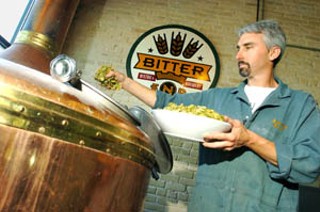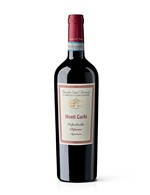Hops, Barley, and ... Rainwater?
The Bitter End's Environmental Pale Ale is ready just in time for the Texas Craft Brewers Festival
By Wes Marshall, Fri., May 14, 2004

Have you ever had a longing for beer that was good for you? Well, I think we've found one right here in Austin. It is the new Environmental Pale Ale from the Bitter End, brainchild of Tim Schwartz, award-winning brewer, and Richard Heinichen, purveyor of all things rainwater. They can't claim any medicinal powers for the beer, but I watched them make it, and I can attest they used only the finest natural ingredients – organic hops and barley along with rainwater collected near Dripping Springs, Texas. With the Texas Craft Brewers Festival coming May 15 (see p.52 for details), we thought you might enjoy following the genesis of this completely unique beer, along with its rainwater cousin, the Bitter End's Poindexter Pils.
"As far as we can tell, no one has ever made beer from rainwater before this." Schwartz was telling me about his new creation while checking a huge vat of something that looked like oatmeal. Four hundred pounds of organic malted barley were stewing in 150 gallons of very hot rainwater. The entire brew room (the part you see on the left when you walk into the Bitter End) was steamy hot. Schwartz was pacing around in his rubber boots, answering my questions while watching his beer. A local home brewer named Chris was standing behind me, also asking questions and generally staring at Schwartz like Grasshopper learning from Master Po.
The air was thick with humidity and hot barley cereal smells as Schwartz cooked the malt. The goal was to get it to 150 degrees to morph the starches into simple sugars so that fermentation could take place and create the fun ingredient in beer – alcohol. He clearly knew his craft, running back and forth, taking measurements, stirring the pot, sending the liquids to a different tank, measuring his organic New Zealand Hallerton hops. Schwartz reminded me of an Iron Chef, moving fast but carefully judging his ingredients, prep, and cooking, aiming at creating liquid art. He was draining the liquids from the hot tank into a cooler tank to cool them off so he could add the yeast. When that was done, Schwartz hurried out of the room in search of some additional implements.
While Schwartz was out, I asked Chris about the difference between home brewing and making beer on the scale of the Bitter End. "Well, for instance, home brewers don't make the malt blend because it takes too much space and equipment," he said. "Home brewers usually just start with an extract. Tim does it all by hand to get perfect control of the color and flavor." Then, with a touch of irony, he added: "Plus, Tim has a lot more experience."
Schwartz came back in with a plastic trash can and started shoveling the spent barley out of the tank. It's an environmentally conscious system; they even send all of the spent grain to cattle farmers for feed. He takes care to make sure everything stays clean because even a little impurity in the beginning can cause a lot of problems down the line. But I was still wondering how Schwartz got interested in working with organic hops and barley and using all these lengthy techniques. "I started home brewing when I was 24," he explained. "My wife and I would stop at brewpubs all over the United States. We really liked places like New Belgium in Fort Collins. They are environmentally sound. They use wind power and recycling. I've always wanted to try something along those lines."
But why rainwater? For years, Schwartz had wanted to try soft water to make his beer. Austin's water contains minerals and salts, not to mention chlorine, all of which add bad flavors to beer. Recently, he installed a rainwater system at his home and fell in love with the water. Also, one of the world's most famous beers, Budweiser Budvar from the Czech Republic, uses a very soft water. He thought that since he was going to make a beer from rainwater, he might as well go all the way and make an organic version.
All of this wouldn't have been possible without the dogged determination of Richard Heinichen, self-proclaimed Mayor of Tank Town World Headquarters, purveyor of Richard's Real Rainwater, co-author (with Suzy Banks) of Rainwater Collection for the Mechanically Challenged, and soon to be (hopefully) maker of Heinichen and Berry Pail Ale. Heinichen and Schwartz share a friend in Emmett Fox, the owner of Asti Trattoria, who recommended to both several years ago that they try a rainwater beer. That was no stretch for Heinichen – he's always made his home brew from rainwater. But Schwartz has to follow government standards, and believe it or not, the government didn't consider rainwater a potable water source.
For years, the only forms of water our government considered drinkable were ground, well, surface, spring, artesian, and glacier. Never mind that all of those had one time or another fallen from the sky. Heinichen had to go to the Texas Natural Resource Conservation Commission and fight his way through a bunch of rigmarole to get them to accept the fact that some of us might like to drink rainwater. Once he succeeded in getting governmental approval, it opened the door for his bottled water. A little later, Schwartz and Heinichen started talking about doing a beer again, and the Bitter End's foray into rainwater beer was born.
The Environmental Pale Ale was a gamble for Schwartz. "I've never used these New Zealand organic hops before, and I don't really know how they'll come out. My guess is it will be a great beer for food, especially spicy food or hamburgers." There's a good reason he's guessing. Hops are a funny thing. They can vary in intensity, making the brewer's art all the more difficult. On top of that, drinkers have different ideas about hops. Beer fanatics think they add important character to beer. The Keystone beer crowd thinks hops make a beer bitter. The New Zealand hops are both expensive and rare, so this is Schwartz's first time to use them.
The other beer Schwartz is making from rainwater is Poindexter Pils. It is made using high-quality but nonorganic ingredients. Schwartz's goal here is to produce a classic golden lager: crisp and floral with a spicy aroma and sweet malt character but lots of hoppy bitterness for balance. This is a much more predictable beer, and though it should be great with fish or chicken, the way most beer drinkers will like it best is by itself.
Both the Environmental Pale Ale and the Poindexter Pils will be available at the Texas Craft Brewers Festival and at the Bitter End. Unfortunately, both will be offered in very limited quantities that will probably be gone within the next few weeks. Don't miss your opportunity to try these truly unique mixtures and experience some of Schwartz's brewing art.![]()








